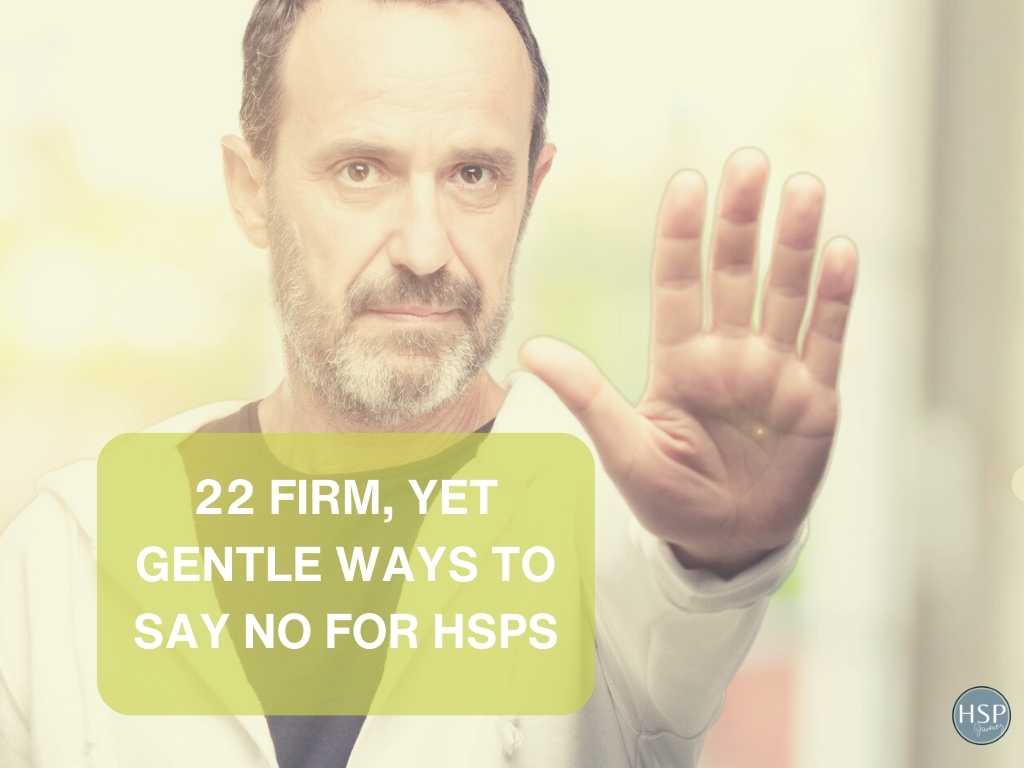For many adults and highly sensitive people alike, saying no doesn’t come naturally. You may have had parents who allowed other family members to walk all over them, or you might been surrounded by adults in your family who were good at having firm personal boundaries. Yet as you navigate decisions, your sensitive nature has taken charge over the years and you’ve found it too difficult to say no in your own life. Either way – nature or nurture – we can all benefit from 22 firm, yet gentle ways to say no for HSPs.

Table of Contents
Key Reasons Why it Can be Hard for People to Say “No”
First of all, you’re not alone in struggling to say “no.” Most people do care what other people think and generally want to help when they can. However, as highly sensitive people, you have more needs than the average person and you need to guard your energy wisely. Below are some of the most common reasons why people have trouble saying “no” and what might be lurking behind these difficulties.
- Fear of conflict or confrontation. Saying no may lead to an uncomfortable disagreement or feeling of tension with the other person. Many want to avoid potential arguments.
- Wanting to be liked/please others. People often have a strong desire for social approval and acceptance. Saying no could make someone feel like they’re letting others down.
- Difficulty setting boundaries. It takes practice and self-awareness to understand one’s limits and capacity. Some struggle to distinguish what they can and can’t realistically take on.
- Obligation or pressure. There may be an implicit or explicit expectation that the request will be fulfilled. This social pressure can inhibit saying no out of a sense of duty.
- Concern about repercussions. People may worry that refusing could damage relationships or social standing in some way. This fear of consequences can paralyze saying no.
- Associating saying “no” with failure. Rejecting something could bring feelings of guilt or being a “failure” for not meeting the standards of others.
Establishing confidence and learning to prioritize one’s own needs can help overcome these barriers to setting the boundary of saying no when needed.
Saying “Maybe” is the First Baby Step to Saying “No”
For all those HSPs out there who gasp at the thought of saying “no” but can’t, I want to invite you to think about saying “maybe” instead of “yes.” This is the first hard step to putting more boundaries in place so that you can prioritize self-care and not deplete your energy and time reserves on a regular basis if your life is somewhat out of control.
Here are 5 Gentle Ways to Say “Maybe” When You’re Not Ready to Say “No”
- “That sounds interesting. Let me check my schedule and get back to you.”
- “I’d like to, but I need some time to think about if it fits with my other commitments.”
- “I’m not sure yet if I can make it work – can I let you know closer to the date?”
- “It’s a possibility, but I don’t want to promise anything until I’m certain. Let me see what I can do.”
- “I appreciate the invite. While I can’t commit right away, I haven’t ruled it out completely either. I’ll let you know as soon as I have a better idea of my availability.”
The “maybe” gives you flexibility without a direct no, while still managing expectations. It buys you time to properly consider without pressure. And it keeps the door open in case you’re able to join after all. Gentle hesitation is better than a hasty rejection you may later regret.
22 Firm, Yet Gentle Ways to Say “No” for HSPs:
- I wish I had the space in my life to help, but I’m afraid I can’t do it during this season.
- Unfortunately, I have other commitments and won’t be able to help out. I really wish I could.
- I’ve checked my schedule and I just can’t figure out a way to fit it in. Feel free to ask me again in the future.
- Between my kids’ schedules and my work demands, I don’t think I have the capacity to take that on at the moment.
- Let me think about it and get back to you. I want to be sure I can fully commit before saying “yes.”
- While I’m interested, I have some other priorities to focus on first. Can I get back to you?
- I appreciate the invitation/offer but I’ll have to decline. Maybe next time?
- Thank you for thinking of me but I’ll have to pass for now. Feel free to ask me again another time!
- I’d love to help but I just don’t have the bandwidth. Maybe next year?
- That’s not quite going to work for me. What other options might there be?
- Unfortunately, I won’t be able to assist, but please let me know if there’s any other way I can support you.
- I’m touched you thought of me, but I don’t think I can take that on right now.
- I really wish I could help, but I’m at my limit with commitments.
- That sounds like a great opportunity, but it’s not the best fit for where I’m at currently.
- I appreciate you asking. Unfortunately, my schedule just won’t allow it.
- Thank you for understanding – I need to prioritize rest/self-care at the moment.”
- “I’m honored by the invitation, but will have to respectfully decline.”
- “I’m afraid I won’t be able to participate, though I admire your initiative.”
- “While I think it’s a worthwhile cause, I don’t have the bandwidth.”
- “I wish I was in a place to say yes, but my capacity is stretched thin.”
- “It’s so kind of you to include me, but I think it’s best if I sit this one out.”
- “I’m offly flattered but will have to decline for now. Maybe ask me again another time?”
The key is to express appreciation for the invitation/request, provide a reason without blame, and avoid definitively shutting the door if possible
A Word About People Pleasing and Boundaries
The more I study what it means to be highly sensitive, the more I find connections between my limits, saying “no”, and my internal and external boundaries. Wanting people to like us and anticipating people’s needs around us can be a dangerous combination. I want someone to like who I am and how I respond to those around me–seems harmless enough. But when we look at everyone else for our worth, then bend over backward to help and do for others, we eventually pay the price. Honoring ourselves for who we are, aligning our thoughts with our creator, and asking for help as we build up good personal boundaries can be an empowering process. Being a people pleaser is mostly not a good life’s aim. Serving others carefully with the energy we have to give is a much better approach.
I wish you blessings and love as you take a closer look at the reasons why you might be saying “yes” when you should be saying “no.” Are you feeling unloved? What about unworthy? Do you have low self-esteem? Or do you feel as though you’ll be rejected if you say “no” and the other person doesn’t receive it well? These are all valid concerns. In working with my HSP clients, we often talk through and process situations like this to look at the why behind the action. Taking a deeper look and asking God to help you in building better boundaries can be life-changing.

Looking for an HSP-Trained coach to help you align your life with your priorities?
Through my Highly Sensitive Person (HSP) certification with the Nickerson Institute, as well as being an HSP, I offer HSP coaching to develop specific goals around your HSP needs. We HSPs frequently deal with anxiety and overstimulated nervous systems that prevent us from achieving peace and attaining our life goals. HSP coaching with me includes a detailed review of your sensitivities and a mutually-desired plan for growth and management of this superpower to shift negativity and begin seeing yourself as the hero of your own story. (Affordable monthly coaching begins at $150/month.)
Frequently Asked Questions About Boundaries and Saying “No”
Why do HSPs struggle with boundaries?
HSPs are highly empathetic and caring by nature. They can have a hard time denying requests because they don’t want to disappoint or upset others. Saying no can feel hurtful even when needed. HSPs also absorb emotions from their environment strongly, so maintaining boundaries helps filter excessive stimulation that leads to overwhelm. Good boundaries are a skill HSPs must consciously develop.
Why do women have more issues with saying no than men?
Societal conditioning teaches women to be compliant, people-pleasers. They’re often socialized from a young age to consider others’ needs above their own. This can make refusing requests uncomfortable. Additionally, women sometimes fear negative social consequences like being seen as “b****y” for asserting themselves. Proper boundary setting challenges traditional gender stereotypes more for women.
Why is it important to have good personal boundaries?
Boundaries are critical to self-care, stress management, and maintaining a sense of self. They prevent depletion by not taking on more than is reasonable. Boundaries also foster healthy, balanced relationships based on mutual understanding and respect rather than people-pleasing. With boundaries, one can fully participate in life without fear of being overwhelmed or losing their identity.
Be sensitive, be free
*This post contains affiliate links and I will be compensated if you make a purchase after clicking on my links*





[…] person is completely unique with special God-given gifts and abilities. I’ve heard of some HSPs have deep connections with animals in a way similar to the Horse Whisperer–almost reading the minds of the animals they train. Others […]